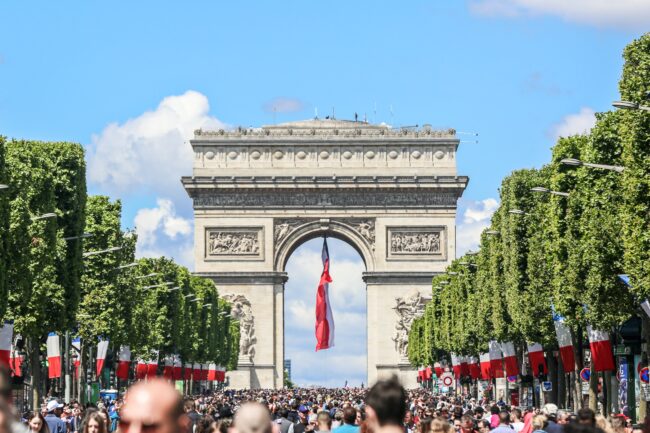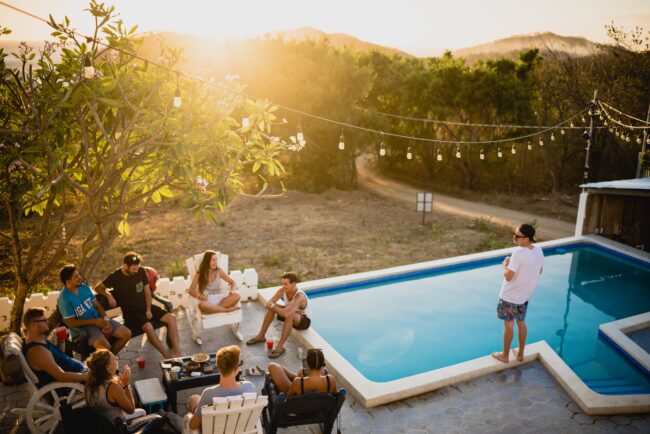If you’ve ever been in France in mid-July, you may have noticed boisterous celebrations and parades, not to mention more than the usual amount of French flags and fireworks. This is because Bastille Day, France’s national holiday, takes place on July 14th, or le 14 juillet.
In this post, we’ll cover the history of Bastille Day and what it commemorates, as well as how the French celebrate it and talk about it in French. Allons, citoyens – let’s dive in!
This article is brought to you by LingoCulture, Where you can get unlimited private French classes via Zoom with native teachers for a flat monthly rate. It’s the closest thing to immersion you can get without living in a French-speaking country. Click here to learn more.
History of Bastille Day
Bastille Day commemorates the storming of the Bastille prison in Paris on July 14th, 1789. This event marked a critical juncture in the French Revolution, ultimately leading to the abolition of French feudalism and the establishment of the First Republic.
Civil unrest had been brewing for years under the reign of Louis XVI, as the result of an economic crisis and resulting rising food prices. This economic crisis was caused by a number of factors, including France’s role in the American Revolution, taxation, and low harvest yields throughout the 1780s. Societal turmoil increased as troops were called into Paris and as high-ranking officials were dismissed from office, most notably the finance minister Jacques Necker, dismissed on July 11th, 1789.
On July 14th, 1789, a crowd stormed the Hôtel des Invalides (a military complex) for weapons. Later that same day, another crowd descended upon the Bastille, a Parisian prison-fortress that served as a symbol for the monarchy. This prison was known for holding inmates jailed by unappealable royal letters that did not indicate the reason for imprisonment. Revolutionaries seized control of the Bastille in the evening, after a battle that had begun mid-morning.
Immediately following the capture of the Bastille by revolutionaries, members of the nobility began to flee France. Throughout the country, other towns and cities began installing their own local governments and militia, disregarding the previously-ironclad royal authority. In August 1789, the Declaration of the Rights of Man and of the Citizen was formally adopted, which served as the first step towards a democratic constitution for France. Several years after the pivotal battle at the Bastille, the monarchy was officially replaced by democracy.
In 1880, nearly one hundred years after the storming of the Bastille, July 14th was officially declared the French national holiday. At the time, patriotism and military prowess were emphasized, a tradition that has continued ever since. Indeed, in the aftermath of World War I and World War II, Bastille Day has been celebrated with extra vigor and joy.

What is Bastille Day today?
Nowadays, Bastille Day is celebrated much like the American national holiday, the 4th of July.
It’s common for French workers to have this day off, but not legally required for employers. As both holidays take place mid-summer, you’ll often find celebrations outside in the form of military parades, barbecues, and fireworks. The traditional military parade in France marches down the Champs-Elysées in the morning, beginning at the Arc de Triomphe and ending at the Place de la Concorde.
While there are no specific foods eaten on Bastille Day, it’s not uncommon to see people indulging in typical French foods such as cheese, bread, pastries, and wine. Finally, just before midnight, there is a spectacular fireworks display at the Eiffel Tower. If you’re planning on visiting France in mid-July, be prepared for road closures and raucous celebrations. Brush up on what French people are and aren’t like, especially in relation to French stereotypes.
Outside of Paris, fire stations in many towns are host to un bal des pompiers (the firemen’s ball). This tradition dates back to 1937, when a group of partygoers followed firefighters on their way back to the fire station after a Bastille Day parade. Some military demonstrations like flyovers can be viewed around the country, as well as historical reenactments. Certain areas organize community meals, known as repas citoyens or repas champêtres. These public gatherings often include music, dancing, and games, as well as the meal itself.
Interestingly, France is not the only place in the world that celebrates Bastille Day, despite its decidedly Parisian origins! Certain Francophone countries, including Belgium and Canada, host Bastille Day celebrations each year. Former French colonies, including Pondicherry in India, French Polynesia, and New Orleans in the United States, also take part in July 14th festivities. If you’re curious about other holidays celebrated in France, check out our post on holidays.

How to talk about Bastille Day in French
When talking about this holiday, the French do not say Bastille Day. In fact, the name Bastille Day was coined by English-speaking countries. In France, the French refer to this day as le 14 juillet (the 14th of July) or as la Fête nationale française (the French national celebration). To wish someone a happy Bastille Day in French, you can say Bonne fête nationale !
When discussing Bastille Day in French, there are many ways to express your thoughts and engage in conversations about this important national holiday. You may wish to discuss the historical significance of the day, talking about La Révolution française (the French Revolution) and la prise de la Bastille (the storming of the Bastille). Perhaps you’ll want to talk about the symbols and emblems of France, such as la Marseillaise (the French national anthem), le tricolore (a name for the three-colored French flag), or the national motto Liberté, égalité, fraternité (liberty, equality, fraternity). Be sure to mention the défilé (parade) on the Champs-Elysées and the feux d’artifice (fireworks).
Other activities worth mentioning include les pique-niques (picnics), les bals populaires (dances), and la musique (music). Of course, you’re sure to hear the popular expression Vive la France ! If you’re planning to attend a celebration, be sure to brush up on useful vocabulary, such as how to say “Cheers!” in French and how to greet people in French.
Conclusion
Bastille Day is a vibrant celebration of French history, unity, and national pride. With its roots deeply embedded in the French Revolution, July 14th was chosen as the French national holiday in part because of its significance as the date of the storming of the Bastille in 1789.
Today, Bastille Day is celebrated with a wide variety of festivities and traditions, including military parades, fireworks displays, picnics, and dances.
By learning and using key vocabulary terms such as le 14 juillet and Bonne fête nationale, you can actively participate in conversations with others about this national celebration. Whether you attend a friend’s picnic, attend a dance, or partake in French delicacies at a café, Bastille Day festivities offer a unique blend of historical remembrance and joyful merriment.
So, embrace the spirit of this iconic holiday, join in the festivities, and raise a toast to the lasting values of liberté, égalité, and fraternité that Bastille Day represents. Vive la France !